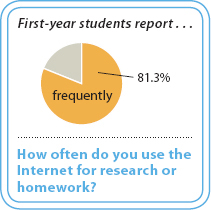Learning to Be Information Literate
People marvel at the information explosion, paper inflation, and the Internet. Many confuse mounds of information with knowledge and conclude that because they found links using a search engine, they are informed or can easily become informed. But most of us are unprepared for the number of available sources and the unsorted, unevaluated mass of information that pours over us at the press of a button. What, then, is the antidote for information overload? To become an informed and successful user of information, keep three basic goals in mind:
- Know how to find the information you need. If you are sick, you need to know whose help to seek. If you lose your scholarship, you need to know where to get financial assistance. If you want to win a lawsuit, you need to know how to find the outcomes of similar cases. Once you have determined where to look for information, you’ll need to ask good questions and make educated searches of information systems, such as the Internet, libraries, and databases. You’ll also want to cultivate relationships with information professionals, such as librarians, who can help you frame questions, broaden and narrow searches, and retrieve the information you need.
- Learn how to interpret the information that you find. It is very important to retrieve information. It is even more important to make sense of that information. What does the information mean? Have you selected a source that you can understand? Is the information accurate? Is the source reliable?

- Have a purpose. Even the best information won’t do much good if you don’t know what to do with it. It’s true that sometimes you’ll hunt down a fact simply to satisfy your own curiosity, but more often you’ll communicate what you’ve learned to someone else. You should know not only what form that communication will take—a research paper for a class, a proposal for your boss, a presentation at a hearing—but also what you want to accomplish. Will you use the information to make a decision, develop a new solution to a problem, influence a course of action, prove a point, or something else? In this chapter we’ll explore ways to pursue each of these goals.
database A database is an organized and searchable set of information. Like a special search engine, a database is often classified by a certain subject area, such as chemistry or U.S. history.
[Leave] [Close]